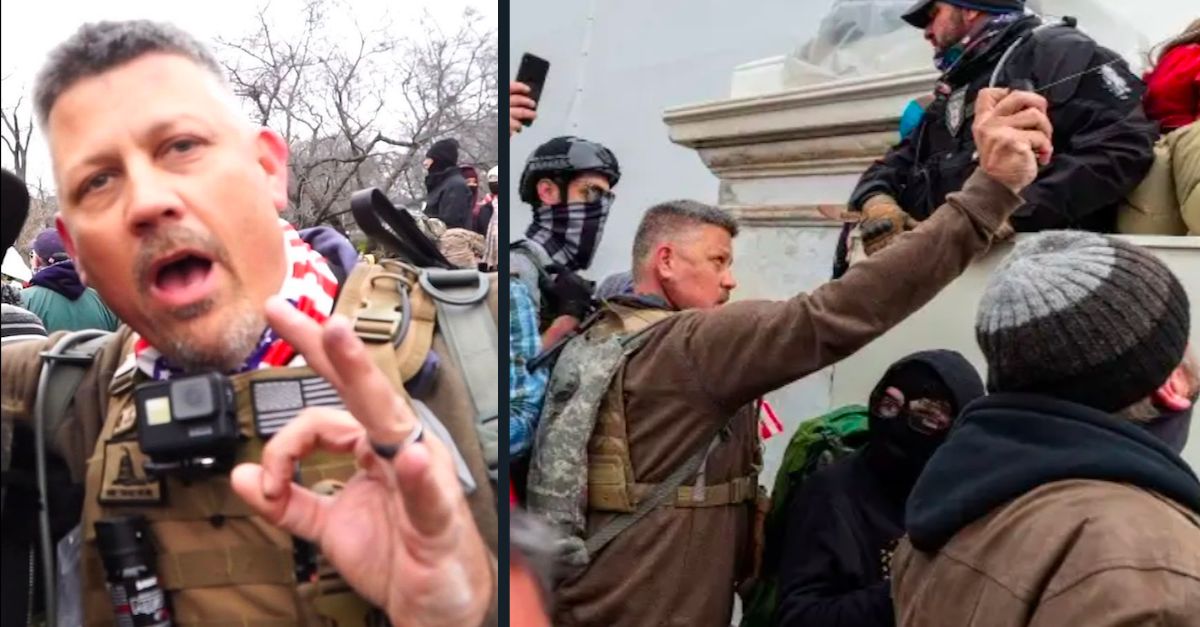
Christopher Worrell (via FBI court filings).
Federal prosecutors have asked a judge to increase the pending prison sentence for a Florida man who fled ahead of his sentencing hearing for felony convictions stemming from the Jan. 6 attack on the U.S. Capitol.
As Law&Crime previously reported, Christopher Worrell went missing in August days before he was supposed to report to court in Washington, D.C., for sentencing before U.S. District Judge Royce Lamberth. Lamberth, a Ronald Reagan appointee, had convicted Worrell in May of seven felonies, including obstructing an official proceeding of Congress, civil disorder, and assaulting officers using a dangerous weapon.
Worrell was finally caught weeks later, in late September — and according to a memo filed by federal prosecutors on Tuesday, he pretended to overdose on drugs in an attempt to further delay facing his fate.
“He apparently had no intention of ever turning himself in,” the DOJ’s supplemental sentencing memorandum says. “Worrell was recaptured, however, when he attempted to covertly return to his residence. Worrell then faked a drug overdose prior to his arrest, and maintained that lie during a five-day hospital stay, wasting the time and money of both medical staff and the Collier County Sheriff’s Office, which provided deputies to watch Worrell 24/7 in a non-secure hospital location and was left to foot the bill for Worrell’s unnecessary medical care.”
Prosecutors wanted to “put these new, aggravating facts” before Lamberth, who the government said should “increase the sentence [the judge] was previously going to impose on Worrell to account for this new misconduct.”
Prosecutors say that on Aug. 14, 2023, Worrell “cut off his GPS ankle monitor in a Walmart parking lot and fled his residence.” Prosecutors say he left behind a note “making clear he had fled.”
Investigators staked out Worrell’s home, where the defendant “attempted to covertly return” on Sept. 28. That’s when the FBI made its move — and discovered Worrell inside, “seemingly unresponsive, with an opened bottle of opioid prescription medication in his hand.”
Agents performed “what they thought were lifesaving procedures” on Worrell and got him to the hospital, the memo says.
It was all for naught.
“This was, the government later learned, all a ruse — Worrell pretended to have a medical emergency as a ‘delay tactic’ to stall the government’s investigation,” prosecutors said. It seemed to have worked, at least temporarily: according to the government, Worrell spent five days in the hospital before being cleared by doctors who believed he had overdosed on opioids. Local sheriff’s deputies kept constant watch, paying thousands in overtime.
“The entire time, Worrell knew he was fine,” prosecutors wrote.
Worrell himself appeared to acknowledge as much. Prosecutors attached an email exchange between Worrell and someone identified only as “B.S.” in which Worrell seems to acknowledge that the “overdose” wasn’t real.
“I need to know the truth bro did you try to kill your self I hope you didn’t I need the truth,” wrote B.S. in an email.
“I did not!!” Worrell replied moments later. “Will explain more when we talk. I already told you some of it[.]”
“OK I believe you,” B.S. wrote back.
“I have never and will never lie to you,” Worrell insisted in his reply. “It was a stupid delay tactic. Will tell you more when we talk.”
Worrell’s alleged actions may stretch the patience of Lamberth, who previously had extended sympathy to Worrell over ongoing health issues: In October 2021, Lamberth found two D.C. jail officials in contempt of court for failing to comply with an order to provide notes about Worrell’s medical care while in detention. Worrell suffered from non-Hodgkin’s lymphoma, a type of cancer that generally develops in the lymph nodes. With appropriate treatment, it is curable in many cases. Lamberth had allowed Worrell to remain on pretrial release and pursue medical treatment.
Indeed, the DOJ noted in its initial sentencing memo that it was seeking a low-end sentence “only because of Worrell’s ongoing medical conditions.” In that August sentencing memo filed before Worrell’s disappearance, prosecutors had requested a sentence of 168 months — the shortest term possible out of an anticipated 168-210 month guidelines range.
Now, it seems, the government has run out of sympathy.
“Worrell has now admitted faking a drug overdose for strategic reasons,” the memo says. “And as the government has documented at length elsewhere, some of Worrell’s claims as to his medical treatment or conditions have been unsubstantiated by, or directly refuted by, medical records from at least a half-dozen different medical providers.”
Prosecutors remind Lamberth that Worrell “repeatedly lied under oath” at trial, and provided what the judge called “the most ridiculous explanation” the judge “had ever heard in [its] life” in an attempt to excuse his 2022 bond violation.
“At this point, Worrell’s claims of past medical mistreatment while in custody should be viewed as suspect,” prosecutors concluded.
In addition, Worrell’s flight, and subsequent fake overdose, “demonstrates contempt for this judicial proceeding and an attempt by Worrell to evade all consequences for his misconduct on January 6, 2021 and his perjury during trial.” Worrell remains “unremorseful,” prosecutors say, and his actions resulted in an “enormous waste of government resources.”
The DOJ lawyers do not specify how much time they now believe Worrell should spend behind bars; the statutory maximum he could face for the obstruction charge is 20 years in prison.
Read the government’s supplemental sentencing memorandum here.
Have a tip we should know? [email protected]

